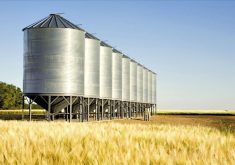Sometimes it’s a job that gets assigned by default. After all, how many farmers really want to volunteer for a job that involves sitting at a desk entering data, paying bills and sending out invoices?
Sometimes, too, there can be an older generation that doesn’t want change. Managing the farm books is their last bastion of control, or it may be the ultimate test of how much they trust their successors.
And on many farms, there may be a different kind of inertia. Life is already busy, so if the older generation has been doing a good job, why change?
Read Also

Riding the tariff rollercoaster
Farmers are accustomed to roller-coaster years. But the current geopolitical windstorm is something else entirely. On his cattle operation near…
On more of today’s farms too, there’s a new question that’s getting asked as well. Why does the new daughter-in-law have to be the person who takes over? Would she be more valuable contributing in other ways? Is there someone else who has the skills?
Regardless, on almost any farm, the person who keeps the books can find themselves in a difficult position, particularly if the farm is multi-generational. It’s definitely a job where emotions can unexpectedly flare up, which means the person doing the books needs good communication skills for steering through. Sometimes too, of course, cash management is a friction point during succession.
Long-time farmer and farm financial adviser Len Davies knows the quandaries well, having often dealt with clients who admit to him, “We know we should transfer the business but if we do, we’ll feel of no use any longer.”
In Davies’ experience, when the founder finds something on the farm that only he or she is responsible for (and the successor is okay with that arrangement) then letting go of integral jobs is easier.
Traditionally, too, the job of doing the farm books has been the responsibility of farm women. For some mothers, in fact, it’s their only remaining connection to the business, and they will not willingly let it go.
“This is hard to deal with since the dads can still hop on the tractor and do something else, but a mom who gives up bookkeeping is giving up her link to the farm,” says Davies. “It has to be handled carefully.”
Paul Reeds is a regional program lead for the Ontario Soil and Crop Improvement Association and when he conducts Growing Your Farm Profits (GYFP) workshops, he hears lots of similar comments about Mom or Dad not turning over the books.
“In a transition, there’s sometimes a worry from the senior generation that they will no longer have a place in the new farm business,” says Reeds. “So they hang on to tasks.”
On the other hand, says Brenda Stefanson, Saskatchewan Agriculture’s regional farm business management specialist in Watrous, for some it’s a lack of trust. They think no one else can do the job as well. “It comes down to how much the mom and dad trust whoever is going to take over. Sometimes if that person is a daughter-in-law, there are some trust issues and some power struggles within the family.”
“There is no one solution,” says Margaret May, also a regional program lead for OSCIA. “Every farm family will do something a bit different, and as long as it works, it’s all good.”
Here are seven ways that might help kick-start the transfer of the farm books to the next generation:
1. Just ask
Harmony on the home front is often better if everyone is honest about which roles are ones they still want to embrace, and which tasks they would rather not do. So why not ask?
The parent may be just waiting for the chance for someone to offer to take over. Sometimes all it takes to stimulate the transfer is just talking and asking about how the transfer would free up some time to do many of the things they’ve always wanted to do.
“My guess is she (Mom) can find lots of things to do to occupy her time!” says May.
Often it’s just out of kindness and wanting to help out that the job of bookkeeping falls to the domain of the mother. “Mom does not believe the next generation has time to do the books too. To her, the others are already so busy,” says May.
In other cases, controlling the books can also mean controlling the cheque book and farm expenses. Maybe the older generation is embarrassed, or doesn’t want to have to ask the next generation for personal draws. Setting out a schedule of draws or paying them outright can quickly solve that issue.
2. Train someone else
Often, the reluctance to change comes for a concern over competency, particularly when the ones taking over are just starting to learn. On many farms, Mom has done a great job on the books for decades and the next generation does not have the skill… yet.
Training or supervising their replacement is often the stepping stone to a smooth transition and retirement out of specific jobs. “I have seen moms actively training the replacement with good results,” says Stefanson.
Also, asking the older generation to be the backup and adviser sometimes provides assurance, which will go a long way to resolving this barrier, says Reeds.
3. Go electronic
In some cases, bringing in new computer technology and accounting software is a surefire way to get the older generation to back away and let the younger generation handle it.
Who-does-what transitions often happen when a change is made in the system. Investing in a new computer and immediately sending someone for training might kick-start the changeover.
Before you take this step, though, talk to your accountant to ensure the new format of the books works for them. Sometimes they have a certain program they prefer.
Note that after completing the GYFP workshop, you can get funding to cover half the cost of courses to train the new bookkeeper and to cover half of the cost of new software programs.
“Sometimes the older generation wants to pass the record-keeping duties on, but there are no takers,” says Reeds. “There’s no system and no one wants to pick up the shoebox full of invoices.”
4. Shift from tax filing to financial management
Record keeping can be seen as a boring or thankless task or worse, and the person is blamed when the business is not doing well. Moving from a tax-filing mindset to financial management might up the motivation to transfer.
“Record keeping, cost-of-production tracking and projections should be seen as an exciting way for the whole farm management team to forecast the farm business’s future and test ‘what if’ scenarios for better business success,” says Reeds.
The incoming management might also want to change accountants, or at least get another opinion. This will sometimes instigate a change in how the farm’s expenses and income are recorded and how that data is utilized.
Getting a farm financial assessment to generate a snapshot of the business and perhaps evaluate cost of production might also spur the transfer of bookkeeping duties.
“Talk, talk, talk about the kind of information you want to get out of the books,” says May.
5. Move the office
Changing the office location to the next generation’s farm or at least out of the house might be the turning point to making this transition. Sometimes convenience is a factor, and setting up a new farm office can really help create more efficient systems (or at least it forces you to get the filing done).
It’s also a clear message of change. But be careful to fully discuss this move well before you plan to do it. “Incoming management should take over the books when all of the management team decides it’s a good time,” says May.
6. Hire a bookkeeper
“If the expertise is not available within the family, then it may be something that should be hired out,” says May.
It’s like all of the other jobs on the farm. The person needs to like it, as well as have an aptitude for it, in order to make it work.
Some farm families are unaware or closed to outside help. However, in most areas, great farm record keeping, accounting and business planning assistance is available, says Reeds.
Most farm families who have opened themselves up to outside assistance find that it’s not a cost, but a net benefit. “They receive professional cost-of-production and business analysis and tax strategies, and best of all it is done on a timely basis so the information is useful,” says Reeds.
7. Bit by bit
In some cases, Mom is good at the books and enjoys doing them, and it works well to have her continue. This might be a good arrangement during the preliminary transition so the next generation can take on more management of the operation without taking on the books too.
Then Mom gradually decreases how much she does and the next generation moves into the role. Some families even set a schedule to transfer the duties, says May.
Sometimes the work is broken down into chunks. By starting with payroll or the cropping sector, the new person slowly moves into the role and the change is incremental so doesn’t threaten the older one or overwhelm the younger one.















